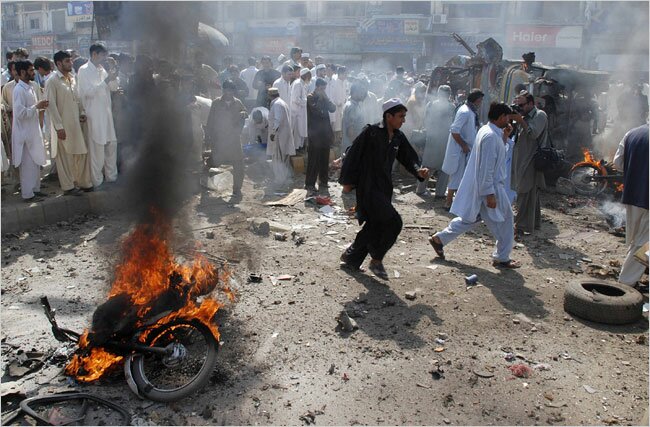 PESHAWAR, Pakistan (Reuters) – A suspected suicide car-bomber killed 49 people on Friday in the Pakistani city of Peshawar in an attack that the government said underscored the need for an all-out offensive against the Pakistani Taliban.
PESHAWAR, Pakistan (Reuters) – A suspected suicide car-bomber killed 49 people on Friday in the Pakistani city of Peshawar in an attack that the government said underscored the need for an all-out offensive against the Pakistani Taliban.
There was no claim of responsibility but Interior Minister Rehman Malik said “all roads are leading to South Waziristan,” referring to the headquarters of the Pakistani Taliban in the northwest.
“One thing is clear, these hired assassins called Taliban are to be dealt with more severely,” Malik told reporters in Islamabad.
“We think we have no other option except to carry out an operation in South Waziristan,” he added, while declining to say when that might happen.
The suspected car-bomber set off his explosives as he was passing a bus, police said. The blast hurled the bus onto its side on a road in a commercial neighborhood of the northwestern city. Several cars were destroyed.
“The bus was making a turn when the blast occurred and it threw the bus into the air,” a witness told Duniya Television.
An official at Peshawar’s main hospital said 49 people had been killed including seven children. About 100 people were wounded.
The bomb dented trade at Pakistan’s main stock market, which has gained about 66 percent this year after losing 58.3 percent in 2008, although it ended 0.28 percent up at 9,768.63.
VIOLENCE PICKING UP
Islamist militants who have set off numerous bombs in towns and cities including Peshawar over the past couple of years, most aimed at the security forces and government and foreign targets.
Early this year, the militants pushed to within 100 km (60 miles) of Islamabad, raising fears for nuclear-armed Pakistan’s stability. An exasperated U.S. Secretary of State Hillary Clinton said the government appeared to be “abdicating” to the militants.
The United States needs Pakistani help against militants crossing into Afghanistan to battle U.S.-led forces there.
But in late April the security forces launched a sustained offensive in the Swat valley, 120 km (80 miles) northwest of Islamabad, largely clearing Taliban from the region although six militants were killed there in the latest clashes, the army said.
The militants suffered another big blow on August 5 when their overall leader, Baitullah Mehsud, was killed in an attack by a missile-firing U.S. drone aircraft in South Waziristan.
Mehsud’s death and reports of infighting over who would take over as leader raised hopes that the militants were in disarray.
Read the whole story






